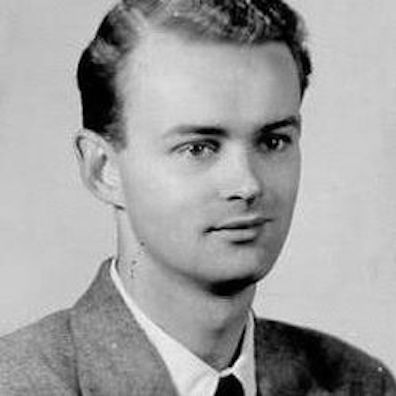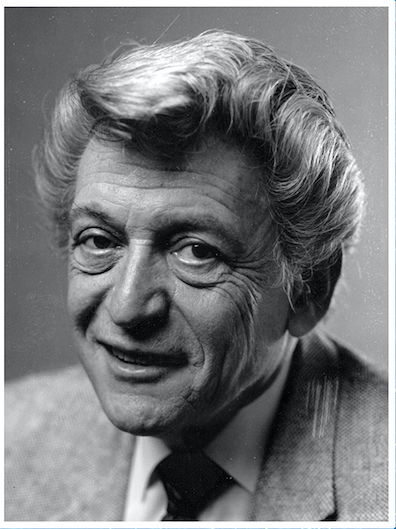The complete thought runs as follows:
They are sundered by a bodily shame so steadfast
that the criminal annals of the world, stained with all
other incests and bestialities, hardly record its breach.
Sons with mothers, sires with daughters, lesbic sisters, loves
that dare not speak their name, nephews with grandmothers,
jailbirds with keyholes, queens with prize bulls.
Stephen goes on to say that sons are inherently antithetical
to fathers, increasing their sufferings, opposing their wills,
draining their vital energies. The idea seems to be that
sexual attraction cannot operate in such a climate.
There can be no doubt about the strength of the taboo, but
such pairings do happen, and one newly reported instance may
hold significance for Joyce's fiction. In a personal
communication, Mark Shulgasser, the partner of composer Lee
Hoiby from 1979 until his death in 2011 and now executor of
his estate, has recounted to me Hoiby's reminiscences of John
Francis Byrne, the "Cranly" of Joyce's Portrait.
In the late 1950s, Hoiby had been the lover and roommate of
Byrne's son, also named John Francis, in New York City. Byrne
Senior had lived in New York since 1910 and Shulgasser reports
that, according to Hoiby, he "often trekked up to the young
men's upper west side apartment to receive oral sex from his
son, Hoiby discreetly leaving the premises to
give them some privacy. Moreover, this had been a practice
between father and son since Jr.s childhood!"
This is admittedly hearsay, several layers removed from hard
evidence, and Shulgasser writes that "You may take it with a
grain of salt if you wish," but he notes that Hoiby was not
one to traffic in salacious rumors: "He was by no means a
Joycean, or much of a gossip. For instance, he refused to
retail lurid stories of his time as composer-in-residence for
Rebekkah Harkness's ballet company, and as acolyte of
Menotti and Samuel Barber, to various biographers, forgoing
the opportunity to make splashy entries in the indices." It is
also worth noting that Hoiby knew the father personally,
having had at least one significant interaction with him.
Numerous sources report that Byrne Senior once asked Hoiby to
notate a melody which Joyce had composed for James
Clarence Mangan's poem "Dark Rosaleen"––the translation
of the Irish poem Roisin Dubh for which Mangan is
most famous. Byrne had sat with Joyce while he sang the tune,
and now he sang it for Hoiby. Hoiby honored his request to set
it down, and years later it became the basis of his piano
quartet Dark Rosaleen––Rhapsody on an Air by James Joyce
(2000).
If Hoiby's report about father-son fellatio is true, it lends
interesting overtones to the distinctly homoerotic scene
narrated in A Portrait in which Cranly grabs Stephen's
arm and asks him whether he would choose artistic exile over
life with someone "who would be more than a friend, more even
than the noblest and truest friend a man ever had.” Stephen is
"thrilled" by Cranly's touch––a detail that might imply only
intense affection but could as easily indicate sexual
excitement. Both men back away from the brink: Stephen asks
Cranly, "Of whom are you speaking?," and Cranly does not
answer. Stephen recalls this incident in Telemachus
when Buck Mulligan, clad only in a bathrobe, makes a similar
overture of friendly intimacy: "Buck Mulligan suddenly
linked his arm in Stephen's.... Cranly's arm. His
arm.... Stephen freed his arm quietly."
The intimacy that Mulligan offers may be merely friendly, but
Stephen rejects it, and in Proteus he associates it
with "Wilde's love that dare not speak its name. His arm:
Cranly's arm. He now will leave me. And the blame?" At several
later points in the novel Stephen seems wary of
men's touches, and in Eumaeus the phrase "a
strange kind of flesh" signals his possible apprehension that
Bloom may have sexual designs on him, as Mulligan has jokingly
insinuated in Scylla and Charybdis.
These many details, beginning in part 5 of A Portrait
and sustained all the way to Ithaca, tell some kind of
story about Stephen/Cranly and Joyce/Byrne, but what is that
story? Hoiby's report, if true, would certainly confirm a
reader's suspicion that Cranly's overture to Stephen is
sexual. But how does Stephen respond? If there is a sexual
element to his feeling "thrilled," then perhaps he is not in
any way offended, alarmed, or repelled. Cranly's attraction to
him, and his reciprocal response, represent a possible
life-altering course, albeit one that he does not choose. When
he appears in Ulysses a year or two later (in Joyce's
biological time), Stephen has gained some distance from any
attraction he felt in that moment and decided that his life
will be heterosexually normative (more or less––Joyce chose a
lifelong female partner but distrusted marriage). He knows
that he does not want a homosexual involvement with anyone,
but he feels no disgust or remorse when he thinks of "Cranly's
arm."
Another way of reading the thrill, more consistent with most
known facts about Joyce's sexuality, would be to regard it as
merely an instinctive emotional response to a close friend's
gesture of devotion. Stephen does not act on the feeling in
any way, whether by saying how much he would welcome such a
friend or by declaring some previously unspoken feelings of
his own. He responds coolly, and to the extent that he
suspects a sexual design that coolness may mask some real
aversion. By the time represented in Ulysses he has
learned to file the incident under Undesired Male Sexual
Advances, and his constant awareness of male touches––a
high-gain radar, always on––shows him on guard against a
possibility that Cranly introduced into his life.
If this second account is closer to the truth, then the Hoiby
story may add a very dark penumbra to the proceedings. In a
personal communication, Vincent Van Wyk observes that Byrne
Senior must have been adept at the art of emotional
manipulation that people today are calling grooming. Any abuse
he committed could not have been simply rape, because the son
agreed to continue playing his part long after he had begun
his own adult life. A man who could talk his young son into
giving him oral sex, and continuing to give it, was surely
gifted in the art of convincing others that he could be just
what they needed him to be.
There is an intriguing analogy here to the relationship
between Joyce and Byrne Senior. Joyce valued Byrne's
friendship because he could tell him anything without fear of
judgment. Byrne's posture, according to Ellmann, was serenely
receptive, self-effacing toleration of the confessions he was
hearing––exactly what Joyce needed. In a man who later would
groom his son for sex, might not such active passivity have
been Byrne's way of preparing Joyce for a sexual advance? By
this reading Stephen's reaction to Cranly's touch has changed
by the time of Ulysses. He now sees it as somehow
predatory. Since the book was published before Byrne's son was
even born, Joyce could hardly have known just how far he would
go to satisfy forbidden sexual desires. Nevertheless, he
introduces the horror of father-son incest in Scylla and
Charybdis, a chapter in which Stephen thinks of Cranly
four times (out of seven total mentions in the novel) and in
which he suspects Mulligan of wanting to make him a "catamite."
If some uncanny insight is implied by this fact, there is no
fathoming the astral planes from which Joyce might have
derived it.
These many evocations of homosexual desire centered on the
figure of Cranly gain one final expression in the novel. Long
after their college days, Joyce visited his friend Byrne at 7
Eccles Street, and in Ithaca Stephen visits the
fictional inhabitant of that house, Leopold Bloom. In a
personal communication Senan Molony notes how suggestive it is
that the two men stand together under the night sky with their
penises in hand. Stephen's refusal of Bloom's invitation to
stay the night and become a member of the household may
reflect a recognition that Bloom is fantasizing about having
him sleep with his wife––a conclusion easy to infer from the
disturbingly pimplike way in which he shows the young man a
picture of Molly in Eumaeus. But the reluctance may
center too on sexual apprehensions about Bloom himself.
Stephen imagines him as a "Vampire" when he awakens on the
streets of Monto, and his impression of "strange...flesh" in Eumaeus
communicates a New Testament abhorrence of homosexuality.
Concerned that publishing Shulgasser's report about the
Byrnes might cause distress to any surviving relatives, and
uncertain about just how much insight into Ulysses
might be gained by doing so, I paused for one month before
beginning a draft of this note. My decision to write it has
been prompted by a growing sense that the incestuous
relationship, if indeed it occurred, resonates far more
strongly in the novel than simply as a bizarre cosmic echo of
Stephen's joking about such incest in Scylla and Charybdis.
Although the report seems credible, the truth may never be
known with certainty. Byrne Senior was a skilled
cryptographer, and he titled his autobiography Silent
Years, so he was no doubt good at keeping secrets.
Readers of Joyce should weigh the known facts, consider their
possible relevance to Joyce's novels, and make up their own
minds about the people involved.
It is not easy to locate information about Byrne Junior. The
Dictionary of Irish Biography (www. dib.ie) says only
that Byrne Senior "was married and had at least one daughter."
But there was a son, born in 1929 and named for his father.
According to a brief biography in Anesthesiology 132.6
(June 2020), in adulthood this man "designed window dressing
for Manhattan department stores." In 1968 he married the
operatic and Broadway soprano Patricia “Pat” Neway, who had
sung “Climb Ev’ry Mountain” in the original Sound of Music,
and who, according to Shulgasser, also "originated leading
roles in two of Hoiby's early operas, The Scarf
(1958) and Natalia Petrovna (1964). She
retired from the stage after her marriage, although her
great success as Magda in Menotti's The Consul had led
some to call her 'the American Callas'."
John Junior and Pat retired to a home in East Corinth,
Vermont, where he died on 29 November 2008 after 40 years of
marriage. Responding to a 2009 blog post about Neway at
www.theatreaficionado.com, nosferaustin writes, "Patricia
Neway is very much alive and living, as mentioned before, in
VT. Her husband, the late John Francis Byrne, died late last
year. He was my great-uncle." Neway herself has since died. I
have found no record of any children born to the couple.



